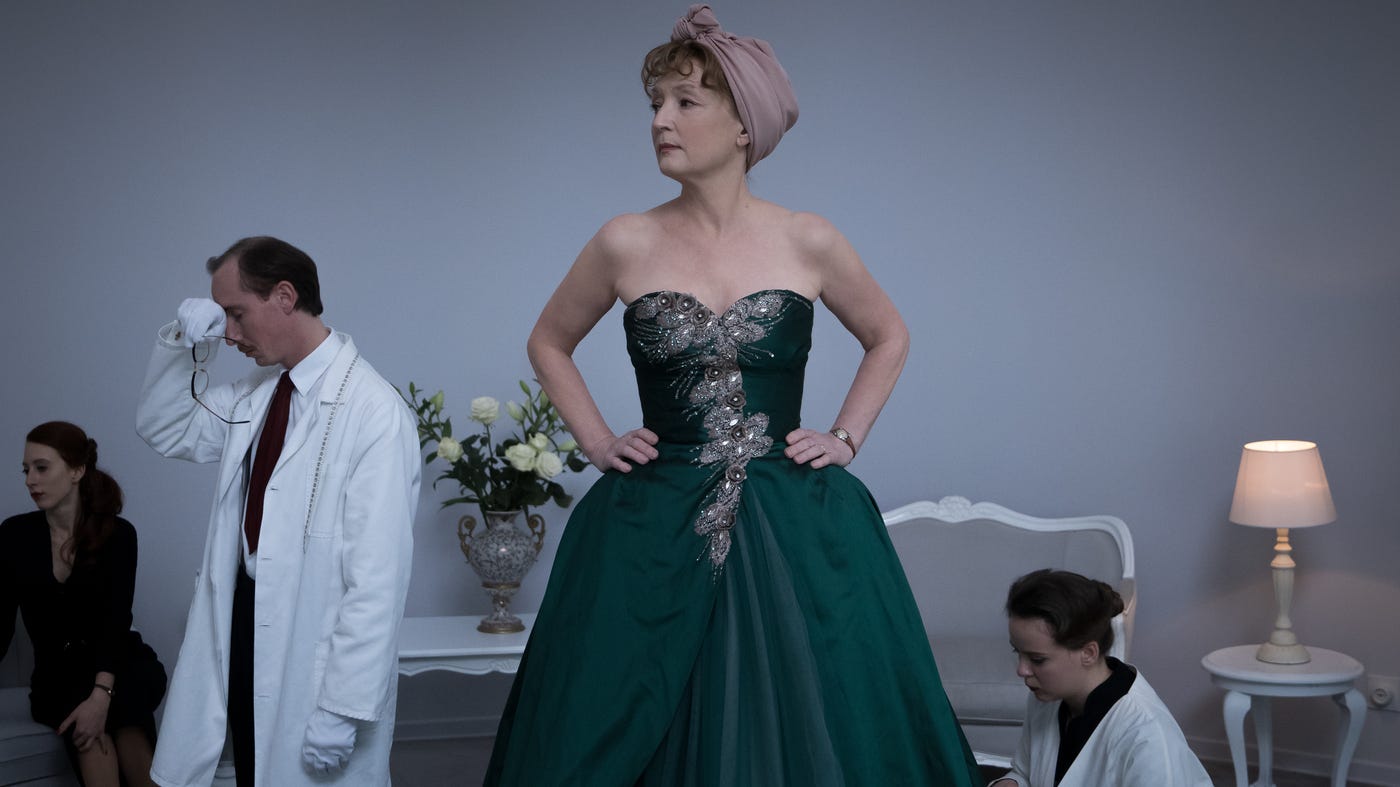I will start this off by saying that I am a bad flyer, so ridden with anxiety that often the only thing I am able to do is close my eyes and give attention to the stiffness in my body. I can’t really stick with a movie. I tried a week ago, rewatching Rear Window on a JetBlue flight. That worked alright. Not too long ago, I had a go at Tenant. That didn’t work at all (that may not have been a product of the anxiety). But earlier this week, on my way back from a cute vacation, I watched the bewitching Mrs. Harris Goes to Paris. All was good up in the sky.
Mrs. Harris Goes to Paris feels like what Mike Leigh would make if he was poppered up. It has the whimsy of Happy-Go-Lucky, even though it’s a shallower character piece. It also has the quality of a movie long-gone, the mid-budget comedy, one that features a simple plot, a powerhouse actress, the illusion of indulgence, and Jason Isaacs or a Jason Isaacs type. It is frivolous and fantastical, but also profound in rare moments. And Lesley Manville wove a performance that dressed my cynicism down. ;)
Manville’s Mrs. Harris is a cheery working-class war widow with a mostly small but satisfying interior life in late 1950s London. She’s been unable to process her husband’s death (declared missing by the military), and is complacent in her own exploitation at the hand’s of *Kristen Bell’s Gossip Girl voice* London’s elite. She works all day as a maid for cheap, gets loaded with her loyal friends Vi and Archie, and conks out. She starts all over again. Fortunately, she’s not sad by her humdrum existence. She believes in goodness, in dreams, and, most significantly, in chance — these were the ingredients chosen to make the perfect little film. They also keep her going.
However, Mrs. Harris’s sisyphean trot falls away when a client taunts her with an indulgent purchase — a dress straight from the atelier of Christian Dior. She’s hooked on this first taste of couture, and it’s then that the movie, with zero logic and gorgeous convenience, decides to gift Mrs. Harris just enough money to travel to Paris, buy her own dress, and hopefully meet Raf Sim—Mr. Dior himself! Our adventure begins, and the Stewardess with the Jane Lynch Hair, brings around some mixed nuts and ginger ale with ice.
—
I often speak about how my relationship to “comfort food” differs from the norm. When I’m feeling bummed out, or say, heartbroken, I rather lean in than watch something digestable, “mental hygiene” is what my grandma calls it. If I’m fixated on the inevitability of aging and my body betraying itself, you bet I’m going to slide my Amour Blu-Ray into my Amour Blu-Ray player. I feel cushioned by what is bleak, by the empathy I find in cruelty, and by comfort that I’m not alone in my pain. Catch me with the Terry Malick over the Garry Marshall.
It was difficult to pinpoint why I embraced Mrs. Harris. I think it’s because it’s accessibility doesn’t feel like condescension. Its moves may be predictable, but it doesn’t disrespect its audience. Mrs. Harris and co. are well drawn figures. They're not relatable or quite real, but they’re understandable. My friend and mentor Josh once told me that, in a writing room, some of the best scenes to create are ones where an audience can see that the parties involved are always both right and wrong in their convictions. It’s the ultimate test of nuanced character building and good writing because it requires the writer to feel ultimate empathy when fleshing out a universe. And that’s hard. Have you ever made a writer who can experience empathy? I haven’t.
I’m not going to run through the machinations of the film’s silly plot because you’re not going to watch it for that. I will share a scene that stuck out to me. It was delicate, surprising, and made a film that should be unconcerned with ~the way the world works~, grounded.
While in Paris, Mrs. Harris is greeted with the kindness of a wealthy widower, played by the Merovingian. He appears to court her by taking her out and presenting her with roses of all flowers. But in a later scene, just as Mrs. Harris begins to open herself up to the idea of love again, he reveals that his fondness for her is comparable to that of his favorite childhood school teacher. She was never going to be a viable romantic partner in his eyes.
It delivered its message. No amount of kindness can chip away at an omnipresent classism. This guy was nice in the way a person with such limitations can be nice, and like in very real life, sometimes the worst blows come from the kind of person who is very consciously trying to resist dishing out blows. He can not care for her but also care for her. He sucks in never considering her because she’s poor, but he’s also very much rooting for her success.
Of course these bits don’t mean the silly fun isn’t worth it. It’s Paris, and Isabelle Huppert plays the director of Dior. She’s a bitter traditionalist, the kind of person who stubbornly holds onto what is setting her back, and gets some good jabs in at Mrs. Harris’s working class frumpiness. Of course she has her comeuppance, but like so much in the film, it’s handled with a grace that kept a dumb smile plastered onto my dumb face.
—
The film ended, the credits rolled, and I still had a horrific three hours left to the flight. I was feeling warm though, the way you feel after inhaling a homemade broth that has, to your luck, been over-salted with Maldon flakes. I thoroughly enjoyed the film, enough so that when I started to watch my movie of the flight…Lincoln, I took a step back. Just then I didn’t need anything heavy. I wanted to close my eyes, ignore the influx of wind bumps and baby screams, and think about a multiverse where Mrs. Harris was Emily’s great grandmother.
Mrs. Harris Goes to Paris is not only playing on select flights, but it is available to rent on Prime.





